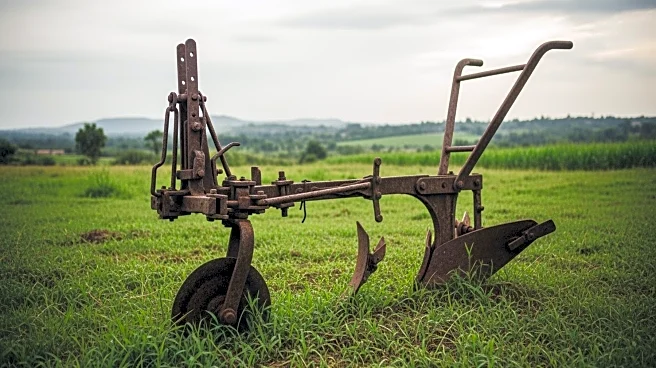What's Happening?
A $500,000 project funded by the Inter-American Development Bank (IDB) aimed at modernizing small-scale farming in Haiti has stalled, leaving innovative tools and research unused. Launched in fall 2020
under Haiti's Technological Innovation Program in Agriculture and Agroforestry (PITAG), the project developed small-scale agricultural machinery to reduce farmers' workload and boost productivity. Despite the completion of the project in September 2024, the tools and research remain locked away in government offices, while farmers continue to rely on outdated manual tools. The project was the first of its kind in Haiti, designed to provide affordable, low-maintenance mechanization options tailored to local needs. However, bureaucratic delays have prevented the distribution of these tools, exemplifying the chronic administrative inertia that has hindered Haiti's agricultural modernization.
Why It's Important?
The stagnation of Haiti's agricultural mechanization project has significant implications for the country's economy and food security. Agriculture is Haiti's largest source of employment, yet it contributes less than 20% to the nation's GDP due to low productivity and limited modernization. The failure to implement the mechanization project leaves farmers struggling with manual labor, discouraging youth from entering the sector and exacerbating food insecurity. Haiti imports over 50% of its food, making it vulnerable to inflation and global supply shocks. The project's success could have reduced physical strain on farmers, improved yields, and encouraged youth to return to agriculture, potentially revitalizing the sector and reducing dependency on imports.
What's Next?
The future of Haiti's agricultural mechanization project remains uncertain as government officials continue to analyze the submitted documents and tools. Without a specific timeframe for approval and distribution, the project risks becoming another shelved initiative. Experts argue that Haiti must build an ecosystem that includes technical schools, local manufacturing of spare parts, and training for rural mechanics to support agricultural modernization. The transitional government faces pressure to revive the economy and restore governance, with calls from farmers and researchers to modernize agriculture or risk its decline. The project's implementation could renew interest in agriculture among young people and help Haiti achieve food self-sufficiency.
Beyond the Headlines
The stalled mechanization project highlights deeper issues within Haiti's agricultural sector, including the need for sustained investment and innovation. Decades of deforestation, poor governance, and lack of investment have crippled domestic production, transforming Haiti from a regional agricultural powerhouse to a nation reliant on imports. The project represents a missed opportunity to address these challenges and foster long-term growth. Ethical and cultural dimensions are also at play, as the project could have empowered local farmers and preserved traditional farming practices while integrating modern technology. The delay underscores the need for effective governance and accountability in implementing development initiatives.








